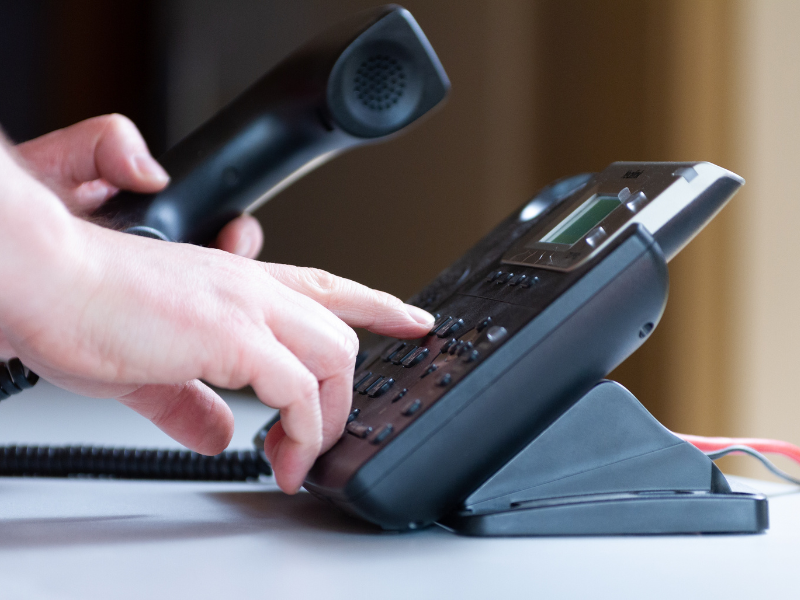PBX phone systems have revolutionized how businesses use telephone services and remain relevant, especially with modern technology. With a PBX system, you can achieve staff connectivity and create a professional impression for your customers.
This article tackles the PBX definition, its types, benefits, and how you can implement one.
Table of Contents

What Is a PBX Phone System?
A PBX (Private Branch Exchange) is an internal telephone network that allows employees to call each other without using too many phone lines from a telephone company. Think of it as the company’s private telephone network. It’s similar to how a router assigns different internal IP addresses to each device within a computer network.
Employees share a finite set of business phone numbers to call externally, but they can have their own phone extensions to talk to each other for free. PBX systems also have features like call forwarding, voicemail, call queues, call transfers, and auto attendant.
How PBX Phone Systems Work
Traditionally, PBX systems use copper phone lines to connect a PBX box to an on-premise telephone system. The PBX box uses telephony switches to direct incoming calls to the right phone extensions.
Today, the more modern PBX systems use VoIP or digital phone signals rather than analog lines. Some systems combine both digital and analog options.
Here’s how PBX systems generally work:
- When an external call comes in, the PBX receives it and determines where to route it based on predefined rules, such as directing the call to a specific extension or voicemail box.
- Employees are assigned unique extension numbers for internal calls and can dial each other directly without going through the external phone number.
- When calling an external number, employees directly dial the number, and the PBX uses the appropriate phone lines or VoIP channels to place the call.
Modern PBX can also integrate with other business systems like CRM, instant messaging, and others for streamlined communications and improved productivity.

Types of PBX Phone Systems
There are three (3) types of PBX phone system:
On-site / Traditional / Analog PBX
This is the oldest type of PBX system that requires extensive hardware like physical wiring, landline phones, and the PBX system itself. Setting it up is expensive and can go offline during unexpected system failures or regular maintenance. It can only support voice calls and offers no integrations with other business systems.
You must also invest in additional hardware wiring for new phone lines. Plus, you will need a consultant or in-house IT expert to troubleshoot the system.
Hybrid / IP PBX
For companies with an existing analog PBX, using a hybrid approach can improve their system by using IP (internet protocol) to link phones and convert voice to data and vice-versa. This expands the analog PBX’s functions to include video conferencing, messaging, and others. It also enables employees to use their own devices (laptops and cell phones).
This is possible through SIP (session initiation protocol) trunking, which enables a phone service to run over your office network and connect phone systems to the Internet. However, if you’re initially setting up a PBX system, this option is still expensive since it requires the same hardware setup as an analog PBX.
Hosted / Virtual / Cloud PBX
This modern PBX system uses internet routers and internet-connected devices, eliminating the need for physical phones and wiring. As such, it’s typically more affordable than an on-site PBX system. The average upfront cost is sometimes free, and ongoing costs are $20-$50 cheaper than the traditional PBX.
With a hosted solution, you work with a PBX provider who handles system maintenance and guarantees 99% uptime. You don’t need dedicated internal experts or consultants to maintain the system. Aside from voice calls, a hosted PBX also offers video calls, conference calls, internet fax, and more. It’s also fully compatible with cell phones and laptops so that you can use it remotely.

Advantages of Using a PBX Phone System
PBX offers businesses several benefits, such as:
- Cost savings: Instead of getting separate phone lines for each department, you can get a few lines and route local or long-distance calls through the PBX system.
- Scalability: You can quickly grow or downsize your phone lines without significant infrastructure changes since it’ll mostly involve adding or removing extensions.
- Professional image: PBX systems have auto-attendants, customized greetings, and even custom-hold music, so you can create a polished impression that enhances your company’s reputation.
- Connect multiple business locations: The same PBX system can connect employees across a broad geographical location and handle call forwarding and routing.
- Ease of call transfers: PBX enables quick call transfers between individuals and departments.
- Remote work support: With a hybrid or hosted PBX solution, you can use any device with an internet connection to make traditional voice and video calls anywhere, allowing employees to work remotely.
- Enhanced security: PBX systems use advanced security features like encryption, access controls, and call logging to protect sensitive communication and prevent unauthorized access to your network.
Implementation and Maintenance of PBX Phone Systems
Before deciding to implement a PBX system, you should consider your company’s needs, business environment, and budget first. First, evaluate what kind of call features you need.
A traditional PBX will be enough if you’re good with standard call features like ring groups, auto attendant, and call transfers. But a cloud PBX is the answer if you want advanced functions like call reports, video conferencing, and CRM integration. Also, an on-premise PBX will be ideal if you only have a single office. A cloud PBX will be better if your employees are on the field or working remotely. Because of its affordability, Cloud PBX is also recommended for small to medium businesses. Meanwhile, large enterprises may consider an on-premise PBX.
PBX systems also require periodic maintenance, so consider the skill of your IT staff or if you have access to an external consultant. If you’re considering a hosted PBX, you will need high-speed Internet.
Finally, consider the costs of setting up and maintaining a PBX system. Cloud PBX requires monthly subscription fees, while on-premise PBX requires hardware, installation, and licensing. Whatever PBX type you choose, carefully considering your options and needs will help you decide what’s best.







